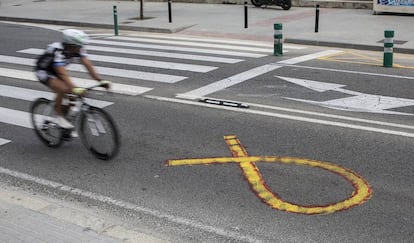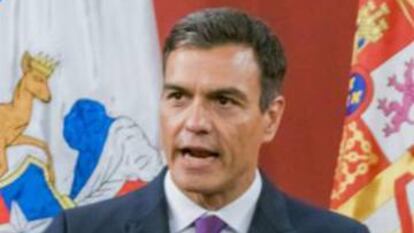Pressure builds on PM to take stand against independence symbols in Catalonia
Ciudadanos and the PP have called on Pedro Sánchez to ban yellow ribbons from public spaces as tensions rise in the region

The Spanish government of Socialist Party (PSOE) Prime Minister Pedro Sánchez is being pressured to take a stand in the ongoing row over pro-independence symbols in Catalonia. The conservative Popular Party (PP) and center-right Ciudadanos have called on the government to ban the yellow ribbons, an emblem of support for jailed pro-independence leaders, from all public spaces.
Pro-independence emblems insult democracy and the rule of law PP leader Pablo Casado
PP leader Pablo Casado said on Monday that the government must “put an end” to the public display of yellow ribbons, arguing the symbols “insult democracy and the rule of law.”
Speaking in Congress, Casado said he also wants politicians to stop wearing the yellow ribbon on formal clothing inside official institutions. “Even in [Madrid prime ministerial palace] La Moncloa, [Quim] Torra entered with a yellow ribbon, with an emblem that is meant to say Spain is not a democracy and that our state has political prisoners,” he said, in reference to a recent meeting between the Spanish PM and the Catalan regional premier.
“It’s inconceivable for someone to enter the La Moncloa palace with an emblem that insults our democracy and rule of law,” he added.
When asked about his thoughts on Catalan politicians who wear a yellow ribbon inside the regional parliament, Casado said: “It’s an assault on the freedom and democracy of Spain, and the government is neglecting its duties.”
Spanish government to defend Judge Llarena

Spanish Prime Minister Pedro Sánchez has said that the government will defend Supreme Court Judge Pablo Llarena in a civil lawsuit filed against him by ousted Catalan premier Carles Puigdemont. Llarena will be called to testify in a court in Belgium on September 4 over allegations he failed to act impartially.
The 20-page lawsuit addresses incidents that date back to 2015 and accuses Spain of being "on the side of Kazakhstan among the criminal states that refuse to obey the principles that govern fundamental universal rights."
"It is not a private issue, it is a state issue," said Sánchez. Justice Minister Dolores Delgado added that the government will defend Llarena "to the very end" despite concerns from other parties that the move will complicate dialogue with Catalonia.
Meanwhile, the leader of Ciudadanos Albert Rivera has demanded the government take down all yellow ribbons from the streets of Catalonia, claiming the symbols are “illegal, unlawful and ideological.” “I don’t care how they do it but that they do it,” he said.
Ribbons of varying sizes have been appearing all over the northeastern Spanish region for months now, placed by supporters of independence for Catalonia from Spain. Those in favor of the ongoing unity of the country, however, have been removing them – in some cases in an organized and systematic manner.
The symbols represent support for the former heads of pro-independence associations Jordi Sànchez and Jordi Cuixart, and politicians such as former Catalan Republican Left (ERC) leader, Oriol Junqueras, who, along with several other key figures from the previous regional government, have been in pre-trial custody since November for their role in the passing of last year’s unilateral declaration of independence in the Catalan regional parliament.
The dispute over the symbol has intensified this summer with Ciudadanos and other organizations launching a series of actions to encourage people to remove pro-independence symbols from public spaces.
Spanish prosecutors drawn into controversy
With the yellow ribbons sparking an increasing number of altercations between supporters and detractors of independence, Spanish prosecutors have stepped in to investigate how local police and Catalonia’s regional police, the Mossos d’Esquadra, are managing the conflict.
On Monday, prosecutors opened a case into a complaint filed by the association Impulso Ciudadano into why the Mossos and local police have identified people who were taking down pro-independence symbols.
The complaint refers to two specific incidents: one on August 17 when the Mossos intercepted 14 people equipped with tools to take down symbols in Tarragona, one of whom was a Civil Guard officer; and one on August 24, when local police, in collaboration with the Mossos, identified and reported eight people for defacing a yellow ribbon. Impulso Ciudadano argues the police acted “arbitrarily, without legal foundations and in a discriminatory way for ideological reasons.”
Catalan premier Quim Torra has criticized the investigation and thrown his support behind the Mossos. “They did their job correctly, any police force would act the same way before a group that works at night with knives,” he said.
English version by Melissa Kitson.
Tu suscripción se está usando en otro dispositivo
¿Quieres añadir otro usuario a tu suscripción?
Si continúas leyendo en este dispositivo, no se podrá leer en el otro.
FlechaTu suscripción se está usando en otro dispositivo y solo puedes acceder a EL PAÍS desde un dispositivo a la vez.
Si quieres compartir tu cuenta, cambia tu suscripción a la modalidad Premium, así podrás añadir otro usuario. Cada uno accederá con su propia cuenta de email, lo que os permitirá personalizar vuestra experiencia en EL PAÍS.
¿Tienes una suscripción de empresa? Accede aquí para contratar más cuentas.
En el caso de no saber quién está usando tu cuenta, te recomendamos cambiar tu contraseña aquí.
Si decides continuar compartiendo tu cuenta, este mensaje se mostrará en tu dispositivo y en el de la otra persona que está usando tu cuenta de forma indefinida, afectando a tu experiencia de lectura. Puedes consultar aquí los términos y condiciones de la suscripción digital.








































